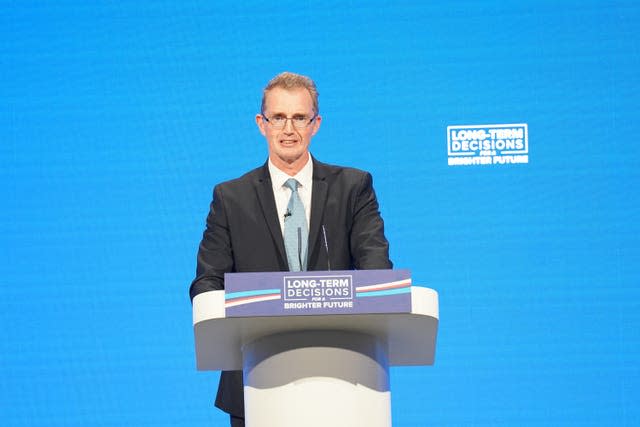Ministers ‘risk repeating past industrial collapse with Tata Steel deal’
The Government risks repeating the mistakes of the UK’s coal industry with steel, ministers have been warned.
Shadow business secretary Jonathan Reynolds claimed he was “begging” the Government not to make an irreversible decision on Wales’s steel industry as he called for further action to prevent the loss of thousands of jobs in Port Talbot.
But Welsh Secretary David TC Davies said the Government had worked to save the “maximum number of jobs”, after it was faced with the possibility of Tata pulling out of the UK completely, resulting in “17,500 people losing their jobs, possibly even more than that”.
Last week, Indian conglomerate Tata Steel confirmed plans to close the blast furnaces in the town – its biggest UK plant – with the loss of up to 2,800 jobs in South Wales.

The Welsh Government’s economy minister Vaughan Gething warned on Tuesday that the UK Government’s £500 million package to help Tata transition to produce more environmentally friendly steel would not be enough to prevent the job losses.
In the Commons, Mr Reynolds warned that without a planned transition towards greener steel production, Port Talbot could suffer a similar fate to areas impacted by the closure of coal mines.
He said: “Levelling up, supposedly the flagship policy from the Government, is surely a recognition that the scars of those years, of the impact of deindustrialisation are still felt in many parts of the UK today. Yet the Government risk making the same mistakes all over again.”
The Labour frontbencher added: “Minister I’m asking you, quite honestly I am begging you, consider the arguments, consider what is really value for money, and do not make decisions that are irreversible and prevent a far better outcome in future.”
Mr Reynolds also said it was “profoundly wrong” Prime Minister Rishi Sunak had not spoken to Wales’s First Minister Mark Drakeford following Tata’s announcement.
Stephen Kinnock, the Labour MP whose Aberavon constituency covers Port Talbot, meanwhile urged Tata to look again at an alternative plan to transition towards greener steel production put forward by trade unions.
“I urge Tata Steel to take the bridge not the cliff edge,” he said, adding: “Their deal is a cliff edge that will send our workforce, our proud communities, over that cliff edge.”

Holly Mumby-Croft, Conservative MP for Scunthorpe, demanded ministers ensure “virgin steel” production remained at the steelworks in her constituency, telling MPs: “If we are going to give British Steel hundreds of millions of pounds of our money, of public money, we need to ensure they retain those blast furnaces until the transition and in short, it must be written into the deal.
“I do not want to see what is happening in Port Talbot, the sad events in Port Talbot, happening to my people in Scunthorpe.”
Mr Davies told MPs: “It came down to this: the Government had to find the solution that was acceptable to Tata that was going to save the maximum number of jobs.
“The Government is not paying £500 million to throw 3,000 people out of work, the Government is paying £500 million to save 5,000 jobs because 5,000 jobs will be saved and around 12,500 jobs will be saved in the supply chain.”
He added: “The reality is Tata were telling us that they were looking to pull out completely from the United Kingdom. If 3,000 jobs is devastating, and it certainly is, how much more devastating would 5,000 jobs be and 12,500 jobs in a supply chain.
“It was a simple choice for the Government, it wasn’t a good choice, it was a choice between seeing 3,000 people losing their jobs or see around 17,500 people losing their jobs, possibly even more than that and that is why the Government committed to pay £500 million towards an arc furnace.
“But let me make one other thing clear: the Government is not going to pay a penny to Tata until that arc furnace is built.”
Mr Gething had earlier insisted that any further rescue package for Port Talbot would need intervention from Westminster.
He told a press conference: “It’s not a marginal investment of one or two million – it’s hundreds of millions.
“I think this comes down to whether the UK Government is prepared to contribute to a future of the UK steel sector.”
Tata said continued blast furnace production in Port Talbot was “not feasible or affordable” and a deal with the UK Government would help transition to a more sustainable, greener steel production using electric arc furnaces.
The UK Government has committed to invest up to £500 million while Tata will spend £750 million.
Tata said more than £130 million will be spent on measures including redundancy terms, skills retraining and help with jobseeking.


